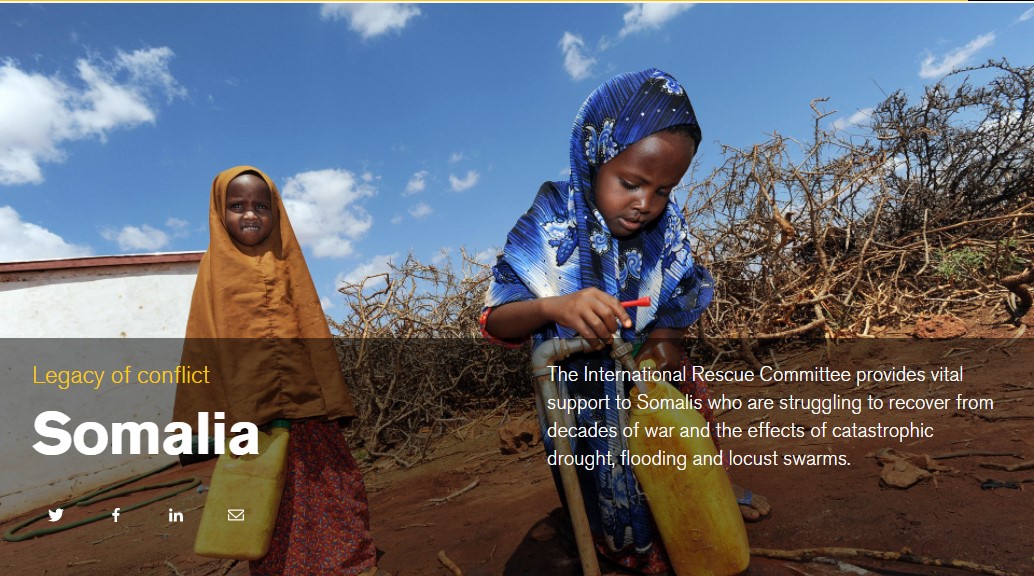
The International Rescue Committee provides vital support to Somalis who are struggling to recover from decades of war and the effects of catastrophic drought, flooding and locust swarms.
Country facts
- Total population: 12.3 million
- People displaced by crisis: 17 of every 100
- Rank in 2015 Human Development Index: Not ranket
- Started work in Somalia: 1981
- People assisted per year: 280,000
Somalia crisis briefing
Somalia, located in the Horn of Africa, has spent decades in the grip of violent conflict. The IRC helps vulnerable Somalis meet urgent needs and provides support to strengthen families and rebuild communities.
What caused the current crisis in Somalia?
Somalia collapsed in 1991 as rival militias battled for control of the capital, Mogadishu. Some 350,000 Somalis died as a result of war, starvation and disease the following year.
Since then, ongoing conflict and recurrent flooding and drought have left Somalia among the world’s least developed countries. Millions of people are displaced from their homes and face extreme poverty and malnutrition.
Thousands of other Somalis remain in the Dadaab refugee camp in neighboring Kenya. Many have lived in exile for two decades; children born in the camp have never set foot in their homeland.
What are the main humanitarian challenges in Somalia?
While the situation inside Somalia has improved in recent years, violence continues to plague the fragile country, and people remain vulnerable to natural disasters.
Somalia has a surprisingly dry climate for a country that sits near the equator (some areas average less than four inches of rain per year). However, in 2015, the weather phenomenon known as El Nino caused unusually heavy seasonal rains. By November, 90,000 people had been affected by the country’s worst flooding in a decade.
Currently, 1.7 million people are facing acute food insecurity, more than double what we saw at this time in 2017. Nearly 50,000 people have been forced to flee their homes in search of food, water, aid and work. The population has not yet recovered from the devastation of the pre-famine conditions two years ago.
How does the IRC help in Somalia?
The IRC’s mission is to help people whose lives and livelihoods are shattered by conflict and disaster to survive, recover and gain control of their future. We first began assisting Somalis in the early 1980s following the country’s decades-long conflict with Ethiopia. Forced to halt our work due to a resurgence of violence, we restarted relief efforts in 2007, partnering with local authorities to create jobs and support communities’ rebuilding efforts.
As the country struggles to recover from the effects of recent catastrophic drought and flooding, the IRC is focusing our efforts in the Galmudug, Galgaduud, Banadir and Puntland provinces by:
- providing emergency relief;
- building and restoring clean water sources and promoting good hygiene practices;
- providing primary health care services via static and mobile clinics to underserved people and training health workers;
- providing job training, food vouchers and direct cash assistance to farmers, shepherds and small business owners;
- partnering with communities to identify, plan and manage development projects;
- promoting and protecting human rights, particularly for vulnerable groups like children and women at risk of violence.
What still needs to be done?
The IRC’s work in Somalia is more critical than ever as Somalia’s leaders struggle to build on the fragile gains made in the past several years. We pledge to put the needs of those most affected by crisis, specifically women and girls, at the forefront of our efforts and to achieve measurable improvements in health, safety, economic wellbeing and empowerment. Here’s a closer look at some of the work we will be doing over the next few years to achieve our goals.
We will continue to support Somalis who have been forced from their homes by crisis, expanding our reach to rural regions that have received little or no aid. We’ll also continue to help Somali refugees who return home from neighboring countries to reintegrate into their communities.
IRC teams and partners currently reach 280,000 people in Somalia with lifesaving support. We expect to reach 620,000 people by the year 2020, focusing on the following areas:
Health
People should be protected from illness and receive medical treatment when they need it. We plan to expand care in IRC-supported health facilities while increasing access of women and girls to health services. We also want to empower communities to detect outbreaks of contagious disease and prevent its spread.
Safety
People should be safe in their homes and communities, and receive support when they experience harm. The IRC will provide counseling and medical care to survivors of sexual assault, domestic violence and other forms of abuse. We will also work to improve survivors’ access to community services.
Economic wellbeing
People should have the means to meet basic needs; they should have opportunities to earn an income and build their assets. Toward this outcome, the IRC will provide cash assistance to vulnerable Somalis during emergencies. We’ll also give grants to entrepreneurs creating small businesses and link them to markets.
IRC-supported village savings and loan groups and job-training programs will help women meet their families’ needs and augment their decision-making power at home. The IRC will also help rehabilitate, construct and maintain water systems and other vital infrastructure.
Power
People should have a say in the direction of their communities and influence over their governments. The IRC will help Somalis work through their country’s legacy of conflict and participate in decisions that affect their lives. We’ll involve communities in planning projects such as road repairs and new schools, and we’ll provide the funding to realize these projects.
We also will pilot an education program to help equip young Somalis to build a brighter future for their country.
As in all our efforts, the IRC will strive to reach more people more quickly, increase the effectiveness of our work, listen to the concerns of those affected by our work, and hold ourselves accountable for results.

